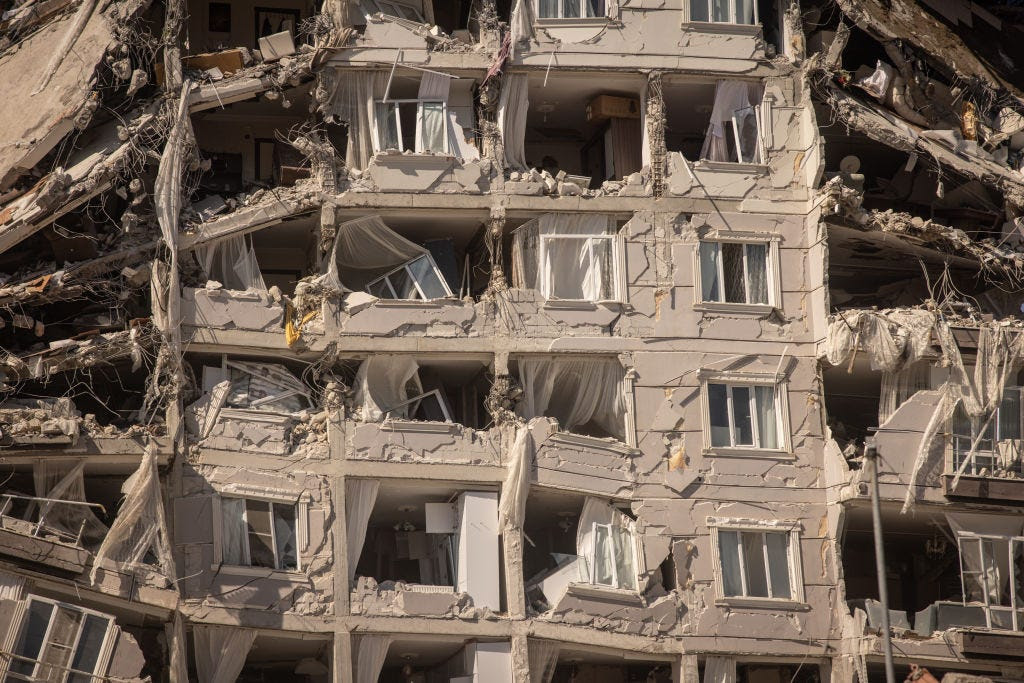*Published with the generous permission of Ruth Ben-Ghiat. Read all of her outstanding writing in her Lucid newsletter.
"The strongman is at his worst as a leader when he is most needed by his country," I write in Strongmen. Turkish President Recep Tayyip Erdogan's response to the devastating earthquakes that struck Turkey and Syria last week offers the latest example of this sad reality. Autocrats lack empathy, and they see humanitarian impulses as weakness. Their priority in any situation is never public welfare, but rather self-preservation.
Crises can be dangerous for authoritarian leaders because such events expose their disregard for their own people and make their incompetence and corruption difficult to conceal.
The pragmatic and callous tone Erdogan took when addressing Turkish earthquake victims was typical. "Whatever happened, happened. Such events are part of destiny's plan,” he told them.
Certainly, Turkey’s modern history is full of devastating earthquakes, with the last serious one occurring in 1999. Yet this quake was on a different scale. Its 7.8 and 7.5 magnitude shocks and heavy aftershocks have affected more than 13 people in Turkey and 10 million in Syria, with a death toll so far of more than 36,000. Doubling the misery, the destroyed areas in southeast Turkey and northern Syria were home to many refugees from elsewhere in Syria and in Iraq. Winter weather and lack of food and shelter is likely to increase the death toll further.
Turkish scholar Gonul Tol, Director of the Turkish Program of the Middle East Institute in Washington D.C., was in Turkey visiting family when the quakes hit. Her brother-in-law's father became trapped under the rubble of his destroyed home. He died without anyone from the government ever showing up to help him. Nor were civil society organizations present. Erdogan, like most autocrats, has targeted many NGOs as foreign agents or terrorist organizations. "People were basically left alone," said Gonul, expressing the anger and sorrow of millions. Collapsed buildings in Nurdagi, Turkey, Feb. 13, 2023. Chris McGrath/Getty Images.
Collapsed buildings in Nurdagi, Turkey, Feb. 13, 2023. Chris McGrath/Getty Images.
The negligent government response to this event compromises Erdogan's political future and legacy, Just a month ago, he likely felt fairly confident about his success in the May presidential elections, despite horrific inflation (over 80% in December 2022, a 24-year record) and growing poverty. A fall 2022 poll showed that Erdogan's AKP party remained the most popular, and Erdogan's approval rating held at 38%.
Divisions within the six-party opposition coalition, which was struggling to agree on a presidential candidate, looked promising for Erdogan. So did his sentencing of his main rival, the popular Istanbul Mayor Ekrem Imamoglu, to two years in jail to "game the competition" (Imamoglu is now appealing the sentence, but his future as a candidate is up in the air).
Like authoritarians from Mussolini onward, Erdogan's popularity has resided in part in his image as a modernizer who brings Turkey international prestige. Speaking on Jan. 7 about relief for victims of a flood in Antalva, he bragged that Turkey possessed "the fastest and most efficient system of intervention in disasters in the world.”
In the strongman tradition, he has also used large-scale construction and infrastructure improvement programs to build patronage networks among beneficiaries of government contracts. Buying off elites also entailed granting amnesties for violations of building codes, including more stringent construction requirements put in place after the 1999 earthquake.
Many buildings that collapsed in Turkey were new construction, fueling public anger and calling attention to Erdogan’s "authoritarian bargain": profits for elites in return for their toleration of the leader's repression. Moreover, homeowners have been paying an earthquake tax for decades to fund preventive measures, and the government won't say what happened to the money.
To deflect attention from his cronyism and incompetence, Erdogan has engaged in favorite autocratic activities: censoring people and locking them up. The government's Twitter ban in the days following the quake, intended to silence criticism of his regime, made it more difficult for the public to find their loved ones and get advice from disaster management professionals.
It is important to crack down on contractors whose shoddy methods cost lives. So many Turks will be happy to hear that more than 100 contractors have been detained across 10 provinces, and the Justice Ministry has established "earthquake crimes investigation units."
Yet in an autocracy no one can detain or investigative the chief culprit, who has also centralized power to an extent that taking any independent initiative, even in a national crisis, is frowned upon within the party and the government.
Like all strongmen, Erdogan alone must be the hero and the man of action.
That's also likely why he did not deploy the military to help Turks. After the 2016 military coup against him, he purged and domesticated the armed forces. Seven years later, he still does not want Turks to build independent relations and trust with the military, even if it costs millions of Turks their lives.
Erdogan will likely postpone the elections from May to June; he would need to amend the Turkish Constitution to hold them after that. That gives opposition politicians more time to regroup in the wake of this disaster. They may find that far more Turks are now listening to them.
Erdogan may cast the earthquakes as a "destiny" to be passively accepted, but the lack of assistance was entirely man-made, and everyone in Turkey knows who calls the shots. As Gonul says, "It's his policies, his corruption and misrule that has caused so many deaths, and someone has to pay for this."
Yet an autocrat will do anything to avoid defeat. Let's hope that Erdogan does not plan a "strongman surprise" for Turks in the coming months to avoid paying the price for his negligence and uncaring. The Turkish people have suffered enough.